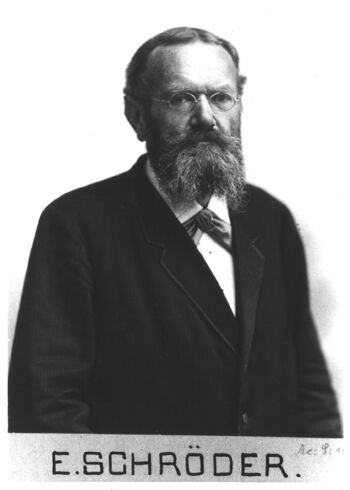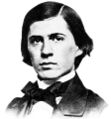Ernst Schröder (nonfiction): Difference between revisions
No edit summary |
No edit summary |
||
| Line 1: | Line 1: | ||
[[File:Ernst_Schroeder.jpg|350px|thumb|Portrait of the German logician and [[Mathematician (nonfiction)|mathematican]] Ernst Schröder. The photo was taken between 1890 and 1902.]]'''Friedrich Wilhelm Karl Ernst Schröder''' (25 November 1841 in Mannheim, Baden, Germany – 16 June 1902 in Karlsruhe, Germany) was a German [[Mathematician (nonfiction)|mathematician]] mainly known for his work on algebraic logic. | [[File:Ernst_Schroeder.jpg|350px|thumb|Portrait of the German logician and [[Mathematician (nonfiction)|mathematican]] Ernst Schröder. The photo was taken between 1890 and 1902.]]'''Friedrich Wilhelm Karl Ernst Schröder''' (25 November 1841 in Mannheim, Baden, Germany – 16 June 1902 in Karlsruhe, Germany) was a German [[Mathematician (nonfiction)|mathematician]] mainly known for his work on algebraic logic. | ||
He is a major figure in the history of mathematical logic (a term he may have invented) | He is a major figure in the history of mathematical logic (a term he may have invented), by virtue of summarizing and extending the work of George Boole, Augustus De Morgan, Hugh MacColl, and especially [[Charles Sanders Peirce (nonfiction)|Charles Sanders Peirce. | ||
He is best known for his monumental ''Vorlesungen über die Algebra der Logik'' (Lectures on the algebra of logic), in 3 volumes, which prepared the way for the emergence of mathematical logic as a separate discipline in the twentieth century by systematizing the various systems of formal logic of the day. | He is best known for his monumental ''Vorlesungen über die Algebra der Logik'' (Lectures on the algebra of logic), in 3 volumes, which prepared the way for the emergence of mathematical logic as a separate discipline in the twentieth century by systematizing the various systems of formal logic of the day. | ||
Revision as of 17:51, 22 November 2016

Friedrich Wilhelm Karl Ernst Schröder (25 November 1841 in Mannheim, Baden, Germany – 16 June 1902 in Karlsruhe, Germany) was a German mathematician mainly known for his work on algebraic logic.
He is a major figure in the history of mathematical logic (a term he may have invented), by virtue of summarizing and extending the work of George Boole, Augustus De Morgan, Hugh MacColl, and especially [[Charles Sanders Peirce (nonfiction)|Charles Sanders Peirce.
He is best known for his monumental Vorlesungen über die Algebra der Logik (Lectures on the algebra of logic), in 3 volumes, which prepared the way for the emergence of mathematical logic as a separate discipline in the twentieth century by systematizing the various systems of formal logic of the day.
In the News
Charles Sanders Peirce invents new variety of Gnomon algorithm, anticipates future work by Ernst Schröder.
Fiction cross-reference
Nonfiction cross-reference
External links:
- Ernst Schröder @ Wikipedia
